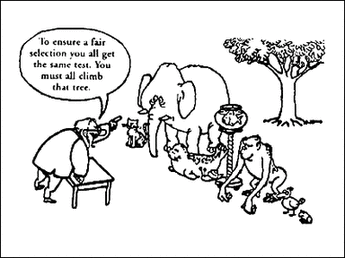|
Many tutors face the difficulty of helping students improve as they see all students as similar student type. In this blog post, I will share 4 types of challenges that my students usually face. Challenge 1: Student A doesn't see the purpose in studying Chemistry and doesn't believe that he has the ability to learn. Response: I explained the value of learning to Student A and also increased the student's ownership of learning by allowing him to dictate how much homework he gets. Whenever he shares about his difficulty in learning, I will pause and listen to help me analyse his weakness in learning. Slowly, Student A started to change his mental mindset and that's the start of seeing improvement in his Chemistry grades. Challenge 2: Student B didn't do well in Sec 3 end-of-year exam. She has insufficient prior knowledge and prerequisite skills needed for mastery of new content for Sec 4. Response: I used bite-sized assessments as a platform for discussion to teach concepts using commonly tested exam questions. I also provided the key phrases and templates needed to gain scientific vocabulary in the shortest amount of time. With the correct focus, Student B managed to catch up and follow the lessons taught in school. Challenge 3: Student C has misconceptions about many topics as he was taught inaccurate information. Response: I will jot down his misconceptions in a notebook and ask him to justify his belief. After the discussion, the student will rephrase the concept below the original misconception. This allowed Student C to revisit the misconception and relearn the correct concept. Challenge 4: Student D doesn't have any learning/studying strategies/exam techniques. She will only do practice questions right before her tests. Response: I will teach study skills which have proven themselves to be effective. During lesson, I will demonstrate thinking aloud skills, do retrieval practice of information and also stress the importance of spaced learning. I will also share the common wrong studying methods made by most students. My slots for 2021 is currently full. Do contact me for a discussion if your child is keen to learn with me from November/Dec 2021 onwards to prepare for 2022. Thanks for reading! Comments are closed.
|
Mrs Lim
A Chem-Addict passionate about teaching and learning Chemistry. Archives
February 2023
Categories |
- Home
- More Information
- Contact Me
- Blog
-
FREE 5-MIN Notes
- 1. Experimental Techniques
- 2. Methods of Purification
- 3. Separation Techniques
- 4. Qualitative Analysis
- 5. Kinetic Particle Theory
- 6. Atomic Structure
- 7. Elements, Compounds, Mixtures
- 8. Ionic Bonding
- 9. Covalent Bonding
- 10. Mole Concept
- 11. Electrolysis
- 12. Energy Changes
- 13. Speed of Reaction
- 14. Redox
- 15. Acids and Bases
- 16. Salts
- 17. Ammonia
- 18. Periodic Table
- 19. Metals
- 20. Air
- 21. Fuels
- 22. Organic Chemistry
- 23. Macromolecules
- Free Printables


 RSS Feed
RSS Feed
